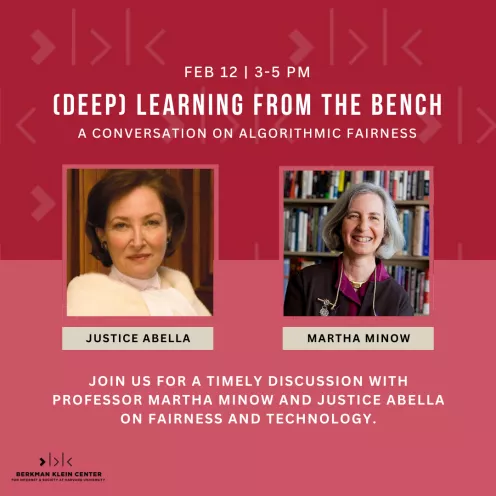
(Deep) Learning from the Bench: A Conversation on Algorithmic Fairness
Monday, February 12
As algorithmic decision-making becomes increasingly pervasive, it raises challenging issues pertaining to equality and equity. This timely discussion on fairness and technology is grounded in Professor Minow’s forthcoming article about Justice Abella's equality jurisprudence. The conversation delves into Justice Abella’s pivotal contributions to defining equality in Canada, and how they might guide our approach to algorithmic fairness. As machine learning and other algorithmic predictive tools rely on biased data and produce disparate outcomes, they highlight unresolved tensions and limitations in legal frameworks in the U.S., Canada and EU pertaining to equality and non-discrimination. Exploring the tension between formal and substantive approaches, the speakers unpack the renewed challenges we face today as discrimination manifests through algorithmic systems, and suggest paths forward to better confront algorithmic harms on the ground.
About the Speakers:
Rosalie Silberman Abella
Justice Abella was appointed to the Supreme Court of Canada in 2004. She is the first Jewish woman appointed to the Court.
She was elected to the Royal Society of Canada in 1997, to the American Academy of Arts and Sciences in 2007, and to the American Philosophical Society in 2018. In 2020, she was awarded the Knight Commander‘s Cross of the Order of Merit by the President of Germany.
She attended the University of Toronto, where she earned a B.A. in 1967 and an LL.B. in 1970. In 1964 she graduated from the Royal Conservatory of Music in classical piano. She was called to the Ontario Bar in 1972 and practiced civil and criminal litigation until 1976 when she was appointed to the Ontario Family Court at the age of 29, the first pregnant person appointed to the judiciary in Canada. She was appointed to the Ontario Court of Appeal in 1992. More here, or watch a 2023 documentary about Justice Abella.
Martha Minow
Martha Minow is 300th Anniversary University Professor of Law at Harvard Law School. Martha Minow has taught at Harvard Law School since 1981, where her courses include civil procedure, constitutional law, family law, fairness and privacy, international criminal justice, jurisprudence, law and education, nonprofit organizations, and the public law workshop. An expert in human rights and advocacy for members of racial and religious minorities and for women, children, and persons with disabilities, she also writes and teaches about AI and legal issues, and about how societies transition from war and atrocities to regimes committed to democracy and justice. Minow served as Dean of Harvard Law School between 2009 and 2017, as the inaugural Morgan and Helen Chu Dean and Professor. She currently is the chair of the MacArthur Foundation, and a member of the governing boards of the Campaign Legal Center (nonpartisan voting rights group), the Carnegie Corporation (philanthropy), and GBH (public media). She also co-chairs the advisory group for MIT's new Schwartzman College of Computing. Minow completed her undergraduate studies at the University of Michigan, then earned an M.Ed. from Harvard and a J.D. from Yale. More here.
You might also like
- communityLegal Alignment for Safe and Ethical AI

